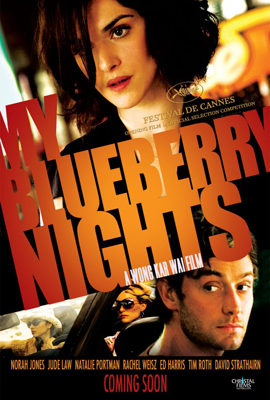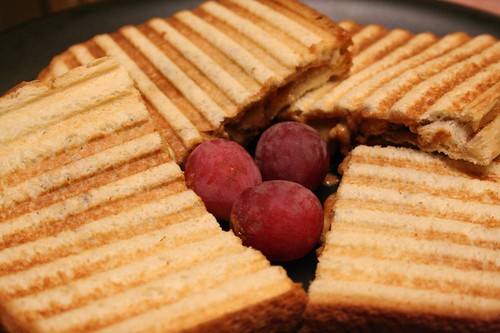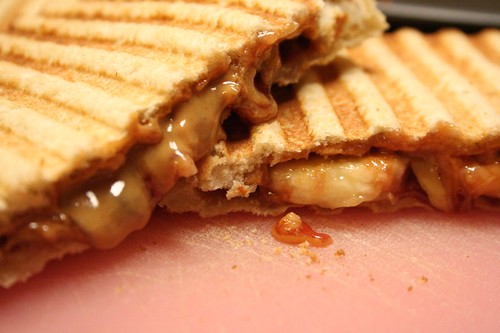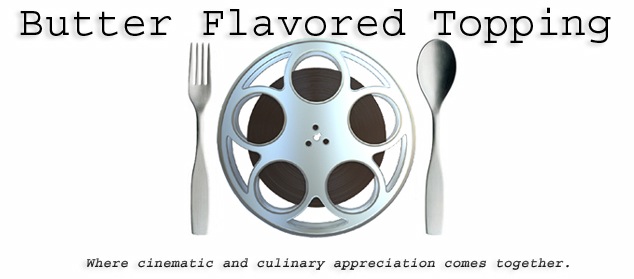 Early in My Blueberry Nights, Elizabeth asks cafe owner Jeremy if her boyfriend has been there with any other women. Jeremy only remembers faces and meals, and Elizabeth discovers that yes, indeed, her porkchop and meatloaf-eating boyfriend has been eating with another. Elizabeth angrily leaves her apartment keys with Jeremy with the intent of never seeing her boyfriend again. Later, heartbroken and lovesick, she returns to find the keys still in Jeremy's possession. Her boyfriend hasn't come calling. Jeremy tries to cheer her up by talking about his desserts. He explains that at the end of the night, the cheesecake, apple pie, and peach cobbler are always finished, but a whole blueberry pie always remains. "What's wrong with the blueberry pie?" Elizabeth asks with great despair. "There's nothing wrong with the blueberry pie, it's just people make other choices."
Early in My Blueberry Nights, Elizabeth asks cafe owner Jeremy if her boyfriend has been there with any other women. Jeremy only remembers faces and meals, and Elizabeth discovers that yes, indeed, her porkchop and meatloaf-eating boyfriend has been eating with another. Elizabeth angrily leaves her apartment keys with Jeremy with the intent of never seeing her boyfriend again. Later, heartbroken and lovesick, she returns to find the keys still in Jeremy's possession. Her boyfriend hasn't come calling. Jeremy tries to cheer her up by talking about his desserts. He explains that at the end of the night, the cheesecake, apple pie, and peach cobbler are always finished, but a whole blueberry pie always remains. "What's wrong with the blueberry pie?" Elizabeth asks with great despair. "There's nothing wrong with the blueberry pie, it's just people make other choices."
"I'll eat it," Elizabeth offers.
This is typically how things unfold in the world of Wong Kar Wai. His films are a triumph of atmosphere and tone over story. The plots meander and end up where they began, if they end anywhere at all. The characters ponder romantic heartache out loud, posit quirky theories, and often undertake curious, fruitless journeys on an emotional whim. Elizabeth has a series of after hours meals with Jeremy, who has a jar full of keys and the stories to match. He's an equally wounded soul who now only observes from behind his counter, refusing to act on his clear affections for Elizabeth. One night, Elizabeth decides to "take the longest way to cross the street" and heads first to Memphis, then Las Vegas, where she encounters a variety of hopeless romantics.
In her acting debut, Norah Jones has a sweet naturalness about her, but she's reduced to the role of observer for most of the running time, waitressing in various locales made all the more bustling and colorful by Wong's distinctly skewed photography. (WKW's #1 rule of cinematography: Get your characters just inside the edge of the frame. Then stop.) In Memphis she befriends Arnie (David Strathairn), an alcoholic who can't let go of his resentful ex-wife, Sue Lynne (Rachel Weisz). In Nevada, she stakes poker player Leslie (Natalie Portman) with her meager savings in exchange for a car.
Wong has a clear fascination with late night dining and ill-fated relationships, and food always takes on intriguing symbolic relationships with his characters. My Blueberry Nights, his first English-language film, is a kindred spirit with his Chungking Express and Fallen Angels. All revolve around greasy spoons and the strangers that inhabit them, passing each other in the night until the moment that they don't, their disparate paths suddenly crossing over. Chungking Express was a wonderful piece of romantic whimsy, but My Blueberry Nights misses the mark, trying to build emotional currents on a flimsy structure of contrived character sketches.
The film is a bit of an acting showcase as there's no shortage of crying, yelling, and other outpourings of emotion. What's missing is the quiet moments inbetween, the moments in which these characters actually make the decisions that lead to the building up or, mostly, breaking down of their relationships. Elizabeth narrates the meandering adventure in postcards written to Jeremy, but her observations don't contain much insight to either the situations or her point of view of them. Oddly, the most endearing moment for me was a throwaway scene when Jeremy, wanting simply to talk to his friend, calls every single diner in Memphis asking to talk to any waitress named Elizabeth.
There are a lot of nice moments in the story. I liked Sue Lynne coming to terms with Arnie by paying his insanely big bar tab, Elizabeth's mobile goodbye with Leslie when they separate at a fork in the highway, and Jeremy's musings on his jar of outcast keys. Unfortunately, the vignettes don't so much end as run out of steam, and Elizabeth's cross-country waitressing journey leads to a simplistic conclusion. My Blueberry Nights isn't more than the sum of its parts, forcing whimsy when there should be honesty. I wonder what would have been if Elizabeth had decided to take the short way across the street, instead.
Quick DVD note #1: You probably know to buy all region DVDs when purchasing on eBay (region code zero). Also remember to buy DVDs in NTSC format, as the PAL videos from Asia and elsewhere don't work in standard North American players.
Quick DVD note #2: An old XBox can play PAL! And if you have an HDMI cable for it, it can work as a poor man's upcoverting player, too. And to think, I was going to banish the thing to the garage. I heart you, old XBox.
25 March 2008
My Blueberry Nights
The King of Kong: A Fistful of Quarters
 Competition and rivalries often bring out the best in people, and just as often bring out the worst. The King of Kong: A Fistful of Quarters features a nerdtastic competition and an engrossing rivalry. I put it on the ol' Netflix queue on a lark, thinking a documentary about competitive Donkey Kong would at least be funny, and at most validate my own thumb-mashing, cartridge-blowing, Contra code-chanting childhood. I just got a Wii, after all, and legitimately consider Wii boxing to be a thorough upper-body workout. Why not revel in old school Nintendo glory?
Competition and rivalries often bring out the best in people, and just as often bring out the worst. The King of Kong: A Fistful of Quarters features a nerdtastic competition and an engrossing rivalry. I put it on the ol' Netflix queue on a lark, thinking a documentary about competitive Donkey Kong would at least be funny, and at most validate my own thumb-mashing, cartridge-blowing, Contra code-chanting childhood. I just got a Wii, after all, and legitimately consider Wii boxing to be a thorough upper-body workout. Why not revel in old school Nintendo glory?
I was emotionally exhausted after screening it. Watching that slimy, wily Billy Mitchell defend his high score is like watching the Yankees buy another All Star. Or Ivan Drago juicing in Rocky IV. Or Kreese telling Johnny to sweep the leg. Occasionally, movie villains come along that audiences love to hate. Billy Mitchell is not one of those villains. I wanted to strangle him. The fact that he is a living, breathing, bona fide real person makes me livid.
I'd rate The King of Kong as one of the best sports movies in recent years. And at first blush, it's probably up there with the all-time great sports flicks. Sure, the inspirational, based on a true story movies like Miracle, Rudy, and Hoosiers stand out, especially since they are about monumental moments in athletic lore and not about a video game. But I can't think of another film that so thoroughly and effectively captures the dynamics of competition, the cliques that form, and the often juvenile means in which competitors view each other and define themselves. How many sports fans quantify their team's wins and losses, not content to let the scoreboard be the defining element it is supposed to be? How many purists are loathe to compare generations, always claiming that theirs was the toughest? The King of Kong illustrates how a level playing field is a completely subjective notion.
Things start innocently enough, revealing Billy Mitchell as a man not content to let go of his 15 minutes of fame, and Steve Wiebe as a man who never got close to a second of it. The tape that Wiebe submits of his first high score attempt, complete with his young child demanding Wiebe stop playing to come wipe his ass, is the kind of detail I expected. It's both hilarious and poignant, a portrait of childhood pursuits that never die. But the real meat of the proceedings comes next, when the governing body of video game scoring, Twin Galaxies (which could be subject of its own doc), refutes Wiebe's score. Did I mention that Mitchell, the poster boy of Twin Galaxies, is also one of the judges? And that he has an oily mullet and sells hot sauce?
How this involves Mitchell's unsettled rivalry with a man who calls himself Mr. Awesome is too... well... awesome to conceive. But it is Mitchell's truly Machiavellian responses to Wiebe's pursuit of a face-to-face battle that blew me away. You can't help but root for the hard luck Wiebe, in part because he does everything asked of him and more, and especially when Mitchell ducks him and sends a series of minions to do his dirty work. It's classic David versus Goliath stuff that exposes the very dark underbelly of this -- and really, any -- competition. The politics and nuances of this world are positively Shakespearean in their breadth.
To recap that last paragraph: competitive Donkey Kong = Machiavelli + Bible + Shakespeare.
This is not hyperbole. I swear, this movie is that good. The greatness of The King of Kong is how it reveals the complexities of competition, no matter how simple the rules. It finds the human drama in a twenty-plus year-old video game and underscores just how rivalries in sport never truly end, even if the game does.
Some people worry that kids are playing too many 1st-person shooters. They ought to watch this film.
For updates on their story since the completion of the documentary, check the film's official site: www.billyvssteve.com
Labels: American, documentary, drama, film, film/TV review, sports, video games
06 March 2008
PB&J Trio
 I just had peanut butter and jelly sandwiches for an entire day. Four of them. One for breakfast, one for lunch, two for dinner. Camille went out of town on business. What's a Food Network-educated chef to do without someone to cook for? Other than indulge his base desires?
I just had peanut butter and jelly sandwiches for an entire day. Four of them. One for breakfast, one for lunch, two for dinner. Camille went out of town on business. What's a Food Network-educated chef to do without someone to cook for? Other than indulge his base desires?
I've always thought the comforting mush that is soft white bread, mashed peanuts, and jam could be dolled up into a pseudo-gourmet novelty. So, after my cheap, lazy ass got through two-thirds of the day with PB&J, I figured I'd go for the trifecta at dinner. And do it Iron Chef style.
PB&J Trio
Ingredients
four slices white bread
peanut butter
strawberry jam
grape jelly
guava jelly
sliced bananas (optional)
Equipment
sandwich maker or panini press
Plug in your machine and preheat. Slather two slices with peanut butter. Slather one slice with your preferred jam. Split the other slice between the remaining two flavors. If you're using a sandwich maker, be judicious with the fillings as they will become a superheated mash that will explode over your face. A panini press does a better job of melding everything together, so if you've got one (and you should), then go crazy. Add banana slices. Assemble the sandwiches and cook, 3-4 minutes. Let cool a minute before halving. If competing on Iron Chef, plate with a fruit garnish (preferably one representing a jam/jelly) and sprinkle with powdered sugar.
Add banana slices. Assemble the sandwiches and cook, 3-4 minutes. Let cool a minute before halving. If competing on Iron Chef, plate with a fruit garnish (preferably one representing a jam/jelly) and sprinkle with powdered sugar.
I only used banana slices on half the sandwichs, so it's actually a PB&J Triple Trio. One thing I wanted to accomplish was eat grape PB&J and strawberry PB&J side-by-side and settle that argument once and for all. Of course, I grew up on the strawberry version, so I'm biased. But in my mind and in my mouth, the grape flavor is too distinct and doesn't meld well enough with the peanut butter. In grape's defense, the fact that it was jelly and not jam makes a huge difference. Jellies are generally too sweet and runny.
Interestingly, the bananas really dominated the strawberry jam and guava jelly. The guava was especially eye-opening. I brought the Hawaiian Sun guava jelly back from (drum roll...) Hawaii on my last trip, only to find it was exceptionally sweet. However, against the peanut butter and paired with the banana, the guava flavor almost disappeared and actually served to brighten the banana flavor.
The banana-strawberry was a little underwhelming. The two fruits always go together so well, and here I thought the starch of the banana would balance well with the sweet jam and creamy peanut butter, but the banana flavor tended to dominate. Also, the heat and pressure of being pressed softens the banana texture, effectively turning it into another jam and undermining my scientific hypothesis for including them to give the sandwich some bite. Thankfully, this science experiment still tastes good and remains cheap and comforting. The master stroke of this preparation is the crispy texture of the bread, which turns an old school comfort food into a warm, crunchy-gooey culinary pleasure. That's how I'd describe it if I were on Iron Chef, anyway.

Atonement
 possible spoilers below
possible spoilers below
First of all, to the marketing genius who decided to score the Atonement DVD commercials with Timbaland's "Apologize" -- stop taking your teenaged daughter's advice on ad campaigns. And stop going through her cabinets and smoking whatever drugs you find. They're hers.
Speaking of marketing, Atonement reminded me why it's good to never see a trailer, read a review, or otherwise know anything about a film before seeing it. I thought it was going to be a schmaltzy romantic throwback involving separated lovers, old English class conflicts, glorious depictions of the French losing World War II, period costumes galore, and misty-eyed love letter voice overs. And it has all that. But the story of Atonement's tragically separated lovers is anything but old school by virtue of its structure. The film begins with the eyes of young Briony, a precocious young teen with a fertile imagination and a penchant for writing. An early sequence cleverly indoctrinates the audience to how this story will unfold. There is an encounter between Briony's prickly older sister Cecilia and Robbie, the son of the estate's housekeeper, that Briony thinks is menacing, but the film replays the events for what they are: the contentious spark that reveals a friendship to be romance. A number of events in the film's first act play out in this fashion, and it feels like a clunky device until Briony witnesses an ugly crime. The only way her young mind can make sense of it is to pin it on the seemingly lewd and uncouth help, thus condemning Robbie to prison and, later, the army.
The ensuing scenes of heartbreak and emotional devastation against the backdrop of a generation-altering war are beautiful in their sweep. The single-take sequence of harried British troops on the beaches of Dunkirk is grand cinema. However, it's the film's ending that pulls everything together. Twists that change the context of every scene that preceded it tend to fall flat on their faces. More often than not, they're cheap gimmicks that essentially boil down to the filmmaker's saying, "Hey, those last two hours you just watched? I was kidding -- this is what really happened." For examples of how a twist like this can go horribly awry, see Abandon and Lucky Number Slevin. Or take my word for it and don't see them because they suck.
Atonement's twist (for lack of a better word) is rooted in the character work, in the foundation laid in the opening scenes, in the thematics, and even the title. It's an affecting piece that had me thinking about it long after the credits rolled, about Robbie's simple mistake of honesty that brought two people together, and how the confused imagination of a young girl destroyed two other lives. I especially appreciated how the story doesn't try to explain Briony's motivations. Her convoluted version of the truth is equal parts jealousy, fear, and immaturity. The notion that she can only amend her lie by devoting her life to writing fiction is what pushes Atonement beyond a simple love story. The film starts as an engrossing romantic tragedy and ends as a provocative view on the sticky relationship between truth and fiction, and the muddy distinction between fiction and lies.
On another note, please give the Amazon.com mp3 store a look. I downloaded the lovely Atonement soundtrack from there (which uses the pounding sound of a typewriter to good effect) and now listen to it in it's DRM-free, 256 kbps glory. They don't yet have the selection of iTunes and the interface isn't as slick for browsing, but they deserve props for forcing the record companies' hand and dropping the handcuffs of DRM. Of course, iTunes is still tops for organizing music, especially if you're not one of the two people who own Zunes, but competition is always fun, so keep it up, Amazon.
Labels: British, drama, film, film/TV review, romance, soundtracks, war






